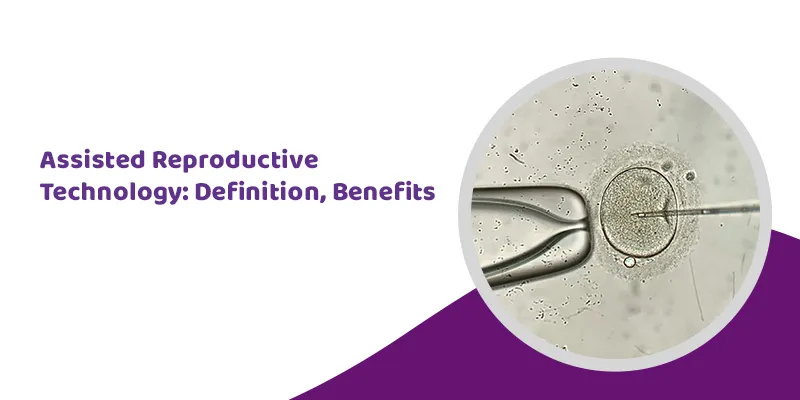Assisted Reproductive Technology: Definition, Benefits
March 23, 2024
Struggling to conceive can be emotionally challenging for couples. Fortunately, advancements in medical science have paved the way for treatments that can help overcome infertility issues. One such solution is Assisted Reproductive Technology (ART), a range of procedures and treatments designed to assist individuals and couples in achieving pregnancy. In this blog, we will explore the definition of ART and its benefits, providing you with valuable information to make informed decisions about your fertility journey.
What is ART?
ART refers to medical interventions that support conception by handling eggs, sperm or embryos outside of the body. These procedures are performed in a controlled laboratory setting and can include techniques such as in vitro fertilisation or IVF procedure, intrauterine insemination or IUI treatment and fertility preservation.
IVF procedure involves the retrieval of eggs from a woman's ovaries, which are then fertilised with sperm in a laboratory. The resulting embryos are then transferred back into the uterus to establish pregnancy. IUI treatment, on the other hand, involves placing washed and prepared sperm directly into a woman's uterus during her ovulation period to increase the chances of fertilisation.
Benefits of ART
- Increased Pregnancy Success Rates: ART has revolutionised modern medicine by significantly improving pregnancy success rates for individuals and couples struggling with infertility issues. With advancements in laboratory techniques and protocols, ART offers hope to those who may have previously believed that conceiving a child was impossible.
- Tailored Treatment Plans: Each person's fertility journey is unique. By evaluating both female and male infertility factors, fertility specialists can develop personalised treatment plans to address specific concerns with the help of ART.
- Addressing Male Infertility: ART is not limited to addressing female infertility alone. It also offers solutions for couples facing male infertility issues. Through procedures such as Intracytoplasmic Sperm Injection (ICSI), which involves injecting a single sperm into an egg, even severe cases of male infertility can be overcome.
- Fertility Preservation: ART also allows individuals and couples to preserve their fertility for future use. Those undergoing medical treatments that could potentially affect their reproductive health, such as chemotherapy or radiation therapy, can opt for options like egg or sperm freezing. This preserves their ability to conceive in the future when they are ready.
- Supportive Care: Apart from the medical aspect, fertility clinics offering ART also provide emotional and psychological support throughout the treatment process. The compassionate and empathetic approach of fertility doctors helps patients navigate the highs and lows of their fertility journey with understanding and guidance.
In conclusion, ART offers hope and solutions to individuals and couples facing fertility challenges. With its personalised approach and advanced techniques, ART has transformed the lives of many by helping them realise their dream of parenthood. If you are ready to take the next step in your fertility journey, we encourage you to reach out to Apollo Fertility for expert guidance and support.
The success rate of the IVF procedure varies depending on several factors, such as the age of the woman, the quality of eggs and sperm, and any underlying health conditions. Generally, success rates for IVF range from 30% to 50%. However, it is important to discuss your specific circumstances with a fertility specialist who can provide accurate information tailored to your situation.
IUI treatment is a relatively painless procedure that does not require anaesthesia. Some women may experience mild discomfort or cramping during or after the IUI procedure, but this generally subsides quickly.
While there are no guaranteed lifestyle changes that will result in pregnancy, maintaining a healthy lifestyle can positively impact fertility. Eating a balanced diet, engaging in regular exercise, managing stress and avoiding smoking and excessive alcohol consumption can contribute to overall reproductive health.